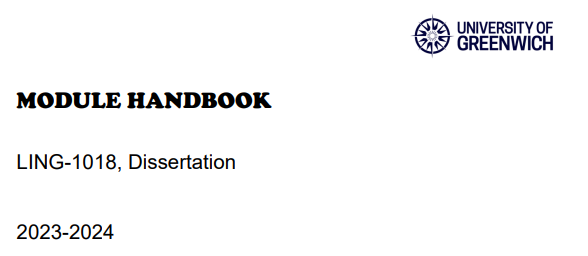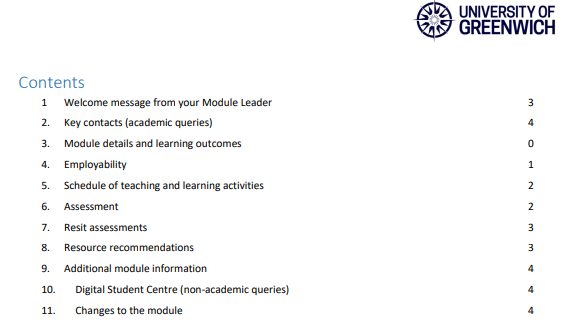| Category | Dissertation | Subject | Education |
|---|---|---|---|
| University | University Of Greenwich (UOG) | Module Title | LING1018 Dissertation |
| Word Count | 15000 Words |
|---|---|
| Assessment Title | Module Handbook |


To provide students with the opportunity to carry out an original and substantial piece of work on an individual research topic of their own choosing (with supervisor approval), relating to the overarching themes of either applied linguistics or TESOL;
On successful completion of this course, a student will be able to:
Glossary: • A pre-requisite module must have been completed successfully before taking this module.
All modules you study on the MA Applied Linguistics programme are designed to complement each other by exploring a wide range of topics, issues and perspectives within the field, culminating in the production of a dissertation. You will also acquire a range of employability skills. For example, you will develop analytical skills, as well as the ability to research and make use of information from a variety of sources in the construction and manipulation of arguments and the evaluation of data sets.
Almost all job descriptions, no matter what the role, require computer literacy, often involving Microsoft Office. This module requires that you undertake written work in Word (or equivalent). Working with MS Office might be second nature to you – but this is not the case for everyone.
Just as it is quite hard to do well in an assessment without reading around the subject, it is also tough to get a job in any industry without an understanding of how it functions, and of the relevant pathways in. In tutorials, you have the opportunity to discuss the field you are interested in working in with your Tutor or ECS members of staff, who can help you to research and develop your understanding of career paths.
How does the course contribute to Greenwich Graduate attributes? The skills listed above are important attributes employers seek. They are developed over the course of the degree through many different courses, types of instruction and forms of assessment. The list should prove helpful to students preparing for job interviews as it helps students to provide concrete examples of skills they have acquired and how they were nurtured through different activities at university. Demonstrating skills to employers and explaining their transferability is an important skill in its own right. It is key to the art of good application writing and interviewing. The Greenwich Employability Passport is itself a means of illustrating transferable skills acquired outside of the classroom.
|
Date |
|
|
15/12/2023 |
Dissertation Workshop (1), 2 pm-4 pm |
|
09/02/2024 |
Dissertation Workshop (2), 2 pm-4 pm |
|
24/05/2024 |
Dissertation Workshop (3), 2 pm-4 pm |
|
July 2024 TBC |
Dissertation Workshop (4), Time TBC |
|
First sit assessments |
Deadline or exam period |
Weighting out of 100%* |
Maximum length |
Marking type |
Learning outcomes mapped to this assessment. |
|
Dissertation |
12 Sep 2024 |
100% |
15,000 |
Stepped |
1, 2, 3, 4, 6 |
|
Assessment item |
Assessment instructions |
Word count |
|
Dissertation |
Guided by a supervisor, the dissertation will allow students to plan a project, formulate research questions (LO1 & LO5); Hone research skills to access and use sources appropriately (LO2 & LO3); Produce an extended piece of independent work (LO4, LO5 & LO6). Your Dissertation must be submitted via Turnitin on Moodle with a headersheet |
12,000 – 15,000 words |
In addition to summative assessment, where you receive a grade, your progress will also be monitored through formative assessment, which includes intentional questioning, workshop discussions, activities and presentations. Students will have the opportunity to present their projects to the class and receive peer and lecturer feedback in a class discussion after the presentation (LOs 1,4,5), which will feed into the final dissertation (LO 6).
Individual feedback will be provided, and the opportunity to meet with your supervisor will be offered.
|
Assessment Domains |
0-29% Fail |
30-49% Fail |
50-59% Good |
60-69% Very Good |
70-79% Excellent |
80-100% Exceptional |
|
Assessment Domain 1: Knowledge and understanding ofcontent |
Sophisticated, systematic and comprehensive knowledge of the subject area. Critical awareness of current problems and/or new insights, much of which is at, or informed by, the forefront of their academic discipline or area of professional practice. Ability in the appropriate use of the relevant literature, theory, methodologies, practices, or tools to analyse and synthesise at M level. |
|||||
|
Assessment Domain 2: Use of research informed evidence |
A comprehensive understanding of techniques applicable to their own research or advanced scholarship. Originality in the application of knowledge, together with a practical understanding of how established techniques of research and enquiry are used to create and interpret knowledge in the discipline. Conceptual understanding that enables the student to evaluate critically current research and advanced scholarship in the discipline, as well as to evaluate methodologies. |
|||||
|
Assessment Domains |
0-29% Fail |
30-49% Fail |
50-59% Good |
60-69% Very Good |
70-79% Excellent |
80-100% Exceptional |
|
Assessment Domain 1:
Knowledge and understanding of content |
Sophisticated, systematic and comprehensive knowledge of the subject area. Critical awareness of current problems and/or new insights, much of which is at, or informed by, the forefront of their academic discipline or area of professional practice. Ability in the appropriate use of the relevant literature, theory, methodologies, practices, or tools to analyse and synthesise at M level. |
|||||
|
Assessment Domain 2: Use of research informed evidence |
A comprehensive understanding of techniques applicable to their own research or advanced scholarship. Originality in the application of knowledge, together with a practical understanding of how established techniques of research and enquiry are used to create and interpret knowledge in the discipline. Conceptual understanding that enables the student to evaluate critically current research and advanced scholarship in the discipline, as well as to evaluate methodologies. |
|||||
|
Assessment Domain 3: Evaluation andanalysis |
Demonstrates critical thinking and enquiry, deals with complex issues both systematically and creatively, makes sound judgements in the absence of complete data, able to communicate conclusions clearly to specialist and non-specialist audiences where appropriate. Able to draw upon critical evaluation of current knowledge in the field to propose new hypotheses. Originality in critical analysis and interpretation and application to appropriate contexts. |
|||||
|
Assessment Domain 4: Communication, Organisation and Presentation |
Demonstrates self-direction and originality in tackling and solving problems, and able to act autonomously in planning and implementing tasks at a professional or equivalent level. Expresses ideas effectively and fluently. Evidence of innovation and/or well- judged experimentation and risk-taking. Use of clear, accurate English, well organised and well presented, with flow and progression. |
|||||
|
Assessment Domain 5: Referencing andcoverage |
Sources used are all acknowledged in the text and reference list/bibliography using correct academic citation – including online sources.Referencing is consistent throughout. Follows a professional approach to academic practice. Bibliography has considerable strength in breadth and depth and all sources are primary sources. Comprehensive range of evidence used. |
|||||
|
Assessment Domain 6: Graduate employability and application of skills |
Able to reflect on, evaluate and action plan in detail for the development of transferable skills. More advanced practical and/or technology-based skills. Sustained successful self-management. Strong evidence of successful group work, goal setting, debate, interpersonal skills. Demonstrates initiative and creatively. Understanding of motivation and resilience. Practice in making job/ training applications appropriate following M level award. An established professional online identity. Effective communication in a range of different formats; able to engage the audience. |
|||||
To pass this module, you must achieve an overall mark of 50+.
For coursework, the marks and feedback will normally be provided to students within fifteen working days of the submission deadline. In exceptional circumstances, where there is a delay in providing feedback, you will be informed by the module leader.
If you do not pass a module at the first attempt, you will likely be eligible for a resit opportunity on the failed assessments. The Progression and Award Board (PAB) will decide whether you will be offered an opportunity to resit. Note that marks on resit assessments are capped at 50% unless an extenuation has been applied for and granted.
For further details on resit assessments, please see the section on Resit Assessments below. The assessment and feedback policy can be accessed at Assessment and Feedback Policy.
Struggling with LING1018 dissertation and feeling stressed?
Order Non-Plagiarised DissertationIf you are worried about the LING-1018 Dissertation? Then no need to worry anymore! Our experts provide Dissertation Writing Services that are designed for the students. You will get expert guidance and help on assignments that will strengthen your concepts. We also provide you with an assignment example that will help you understand. And the best part? All the content is 100% original, written by PhD expert writers, and well-researched, so that you get the best quality. So don’t delay now; boost your grades with our help!
If you want to see the solution to this brief, then click here: LING1018
Hire Assignment Helper Today!
Let's Book Your Work with Our Expert and Get High-Quality Content
